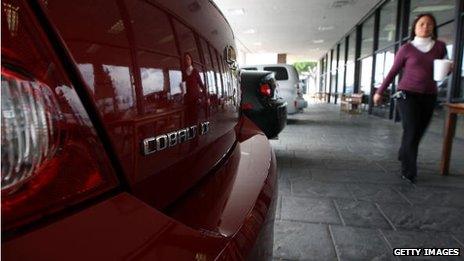GM seeks to bar some ignition lawsuits
- Published

General Motors has asked a US court to bar some lawsuits relating to its recall over faulty ignition switches.
The faulty switches could turn off the engine, disabling the airbags and have been linked to at least a dozen deaths.
The recall was issued earlier this year but GM has admitted some employees knew about the problem as early as 2004.
GM has asked the court to ban cases "alleging purely economic damages" due to the recall. It does not affect cases relating to accidents or injury.
The firm has been hit by various lawsuits since the recalls began this year.
"The lawsuits that are the subject of this motion, most of which purport to be class actions, are brought by or on behalf of individuals who were not injured as the result of any failure of the ignition switch," the firm said.
Old v new?
The carmaker has so far recalled nearly 2.6 million cars over the issue.
However, it has claimed that the problem affects cars that were manufactured in the years preceding its bankruptcy and subsequent bailout by the US government in 2009.
It said the "new GM" - referring to the post bailout firm - had committed to replacing the defective ignition switches as a result of the recall.
"New GM's recall covenant does not create a basis for the plaintiffs to sue new GM for economic damages relating to a vehicle or part sold by old GM," the company was quoted as saying in its filing by the Reuters news agency.
But the firm acknowledged in a statement that "it has civic and legal obligations relating to injuries that may relate to recalled vehicles", and that it was looking at what options may be available to it to deal with those obligations.
However, some of those suing the firm have alleged the firm hid the information about the problem from the US government while it was being bailed out.
They claim that as result of concealing this information the firm was not entitled to protection from liability arising from the issue.
"GM's argument suggests that the US Government would have agreed to extend $40bn of taxpayer money for GM's restructuring, and supported shielding it from liability through the sale order, had it known of GM's intentional misconduct," Reuters quoted the plaintiffs as saying in their lawsuit.
The firm is already facing an inquiry from US authorities over its handling of the issue.